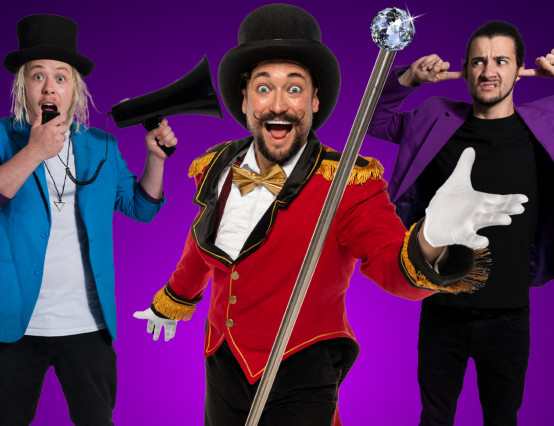At the 2018 Edfringe there was a great sounding session being ran in Fringe Central: Responsible Reviewing. For those that don’t know, Fringe Central is THE place for participants at the fringe (performers, techies etc) to get support and make more of their experience. It’s also home to the Industry and Media offices too. There’s a big programme of activity designed to support the people that make the festival what it is. This session featured a panel of professionals including staff of The Stage (Natasha Tripney chaired this session), The Skinny, The British Comedy Guide and the Wee review.
Attendees were mostly reviewers, there were also some performers and what appeared to be venue and producing staff. This mix of people made for an interesting discussion, some good questions, sharing of practice and an insight to the impact and responsibilities of reviewers.
But what did the conversation cover? Here’s a summary:
How do we address disability and colour blind casting?
Much more than reviewers; as we start to embrace the idea that parts can be played by the opposing gender, we should also look to be more embracing of parts being played by any skilled actor even if they were originally written for or featuring a particular racial profile. But then should there be an element of positive discrimination in order to bring more minorities into the limelight of theatre? Is it fair to choose someone over another person simply for the colour of their skin?
Similarly, there’s much better embracing of disabled actors. But should a fully able-bodied person play the role of someone wheelchair bound? Are there parts which traditionally are played by able bodied people which could be perfectly suitable for someone missing any limbs, wheelchair bound, or indeed with any other disability - hidden or visible.
Extending this debate, we of course need more writers and people in all roles from the wide variety of backgrounds in our society. And should we call a female comedian a comedienne? Why put a differentiator in there at all, they should be held up equally. Should a reviewer ever comment on the suitability of a performer for a role based on these characteristics? Surely we should be focussed on the quality of production before us.
There was some debate about these questions. No particular consensus reached (it’s a huge topic, and much more one for theatre directors and casting agents perhaps) although I think the murmur of agreement leaned toward the idea of being ‘blind’ to any characteristics and judging people by their skill level and suitability to a part, perhaps considering the artistic direction or interpretation of a piece. Although we absolutely must level the playing field for people less represented in British Theatre today. This (for me) starts at access to training and cultural beliefs instilled in young people through school and access to, for example, quality youth theatres.
Social Media and Bloggers
In the rise of the internet age, how do performing companies embrace what people think about them? There’s so much more opportunity for audiences to give instant feedback (perhaps protected by a level of anonymity). It also makes it easier for amateur bloggers to share their opinion - perhaps unchecked, which is especially dangerous if it’s not objective or delivered by someone with experience. Although we don’t want to squeeze out new entrants to the reviewing market, theatre criticism has faced enough challenges in the past few years. However there needs to be an appropriate opportunity for young people to develop their skills & experience in reviewing, ideally with resources and support (which we’ve written about before). But context is key, and amateur blogs should be presented as such, and not offer the pretence of a highly experienced opinion from which to make a final decision whether or not to support a show.
This brings us to social media. The primary reason for social media is promotion, and there might be a temptation for reviewers to tag performers to get additional hits on their website. However, not all performers want to see their review - good or bad - and the mental health of everyone is important. How can they get respite from their show if they wake up to notifications of criticism?
That being said, everyone, including us here at Voice share our reviews on social media so that people can find them and come read. But should reviewers be @mentioning the performers or show specific company? The consensus was NO. It’s about the quality of reviews and impact they have, not the number of visitors to your website.
NB. We often get asked for review links by PR’s and venues, so we tend to tweet with such folks in mention, and it’s then up to the respective agents as to whether to tell the performer - or indeed it’s available for them to come and find. Often the performer is also after their own review, and it’s a complicated administrative burden for our Editor to keep track of who asks for review notifications online, perhaps by email etc. So the short answer is avoid tweeting at performers about their review unless they asked in advance.
Consider the content
A discussion of some depth happened about how long a review should be and the issue of applying star ratings. There’s a call for a nationally agreed system by some, while other publications refuse to offer a star rating, and some focus on a long form enquiry into the piece. Should a review be made up of just the one-liners and quotes a show might take out of it for marketing? Should we be reflecting the politics and content of the piece as well as the aesthetics? I would say yes we should be delving in a bit - but the review needs to remain objective and consider the quality of the piece whilst sharing the crux of the politics. It’s not our role to pass judgement on whether the politics is correct or not, but to share a flavour of what audiences might be in for so they can make an informed decision whether to attend or not. Left wing or conservative, everyone has a unique position on the spectrum.
Of course, we should inherently be providing some quotable phrases and not just waffle on about a show. And each publication must set the standards for a star rating and ensure what makes each star is clear to it’s reviewers; perhaps standardised and somewhat moderated for a fair reflection. It’s important to remember that not everything is five star and it takes some serious consideration as to whether a show deserves a one or two star rating. This is where a good editor can be key and consistent application of factors is useful. This year, Voice decided to publish its star rating system for everyone to see.
A good example at Edfringe 2018 was the Frank Skinner show ‘Nina’s got News’, which garnered reviews of one, two, three, four and five stars. Clearly a polarising play with critics struggling to agree.
Additionally, a reviewer should consider the reaction of the audience. Describe and reflect on any obvious signs. This perhaps help overcome personal bias if it’s obvious by after show comments that most of the audience enjoyed it and you didn’t, then why was that? Of course, it’s your opinion, but make sure you’re considering everything you can. Maybe acknowledge something you hated, or a creative decision you stoutly disagree with which others may have enjoyed.
Body Image
Building on the above discussion about our place as reviewers when it comes to casting and content, there’s a particular consideration for how and when we should comment on what someone looks like. Shaming anyone is never acceptable; does their weight or body shape impact the performance? There might be a rare time where such a mention is justified but we can’t think of one now. Even commenting from a positive perspective should really be thought through, and certainly focussing a review on the size of anyone’s exposed body parts in shows where an element of nudity is given probably doesn’t move the review along at all.
We must be careful and considerate about any comments made - about any gender from any gender. Male, Female and non-identified, everyone can be impacted by your comments. Don’t let such sentiments overtake the message of your review.
What impacts the reviewer?
It’s not just the quality or presentation of a show that affects its eventual rating. The reviewer themselves could be tired, irritable, in an especially happy or forgiving mood, transport might have been delayed which causes them to feel hustled, or a nearby audience member is slurping loudly on a drink. So many things could impact the mindset of the reviewer; often perhaps adding a negative emotion, but sometimes an overly optimistic view. This comes back to the professionalism of the reviewer, their experience, and ability to compartmentalise their feelings so as to view any subject experience in an objective fashion. All of these things are probably never so prevalent as at the Fringe - with a range of late night shows, quirky venues, drunken audiences and even simply sheer volume of shows.
It’s important not just for an editor to consider the comments overall, but for you to question yourself and the comments you’re making - are they fair and justified - both good and bad.
Before the review - communications from performers
A short conversation was had about invitations to review. When should you approach reviewers, how, and what response do you expect. The general consensus of a good approach was to contact a reviews publication (or reviewer direct possibly) at a suitable time depending on their planning. Invitations once Edfringe has already started, for example, could well be too late. We at Voice usually finalise our shows for Edfringe by Mid-July, allowing just a little flex for new additions or changes, so contact us in June to be considered. But the second point agreed in the room, is that we all get far too many requests. Voice alone gets hundreds of emails and requests to see shows. We can’t always reply to every email, (one panellist said she simply doesn’t reply at all in case even a reply sets an expectation of consideration) and you stand a better chance if you both time it right and address us personally. Why would we review your show? Is it relevant to our audience (mainly 16-30 year olds in the UK). We cover a range of free shows and big venue shows, from those with agents and without. We especially want to support young creatives but that doesn’t mean we don’t go and see work by established organisations. Is what you have to offer an especially new concept, piece of writing or interpretation. Agents and companies that can help with the hassle of ticket booking are always appreciated. Try not to harass any publication - resources are finite and the capacity is only ever decreasing unfortunately.
On a plus side, if we don’t get to see you at Edfringe then make sure you invite us to other shows year round. We get out and about as much as possible, and are the Youth Media partner for Brighton Fringe too.
What about some summative tips from the panel?
Don’t sit on the front row with your lanyard dangling, publication branding on display,or notebook out - it’s intimidating!
Don’t be more brutal in your opinions of a show just to make a name for yourself - don’t be unduly derogatory about anyone or anything
You’re a human writing about a human; consider that (whilst not censoring justifiable comment)
Don’t spiel about anything gratuitous or arbitrary.
Errors in judgement happen, so be careful - a proof-reader and/or editor can help avoid this
You should be honest in your review; but also consider whether your review will have an impact on ticket sales - so it must be fair
The depth of your scathing attack may be measured against whether it’s a huge artist or a local group - what skin do they have and how does it affect them
Don’t go off topic
Review the show, not the politics (as above)
The editors job is getting harder - they won’t be trying to censor you, but they have got to consider legal ramifications of what you say
Declare any personal interest in a show (knowing a cast member well for example)
Make sure you mention the themes of the show as well as your opinion on whether or not it’s one to see so a reader can make their own judgement
Hopefully these points and the expansive notes above give you a head start in considering your next review. Apply these thoughts when you’re out and about - especially if you’d like to consider a career.
And remember, if you’re keen to put these in to action then you can post your own reviews to Voice and even apply to join our own team.









0 Comments